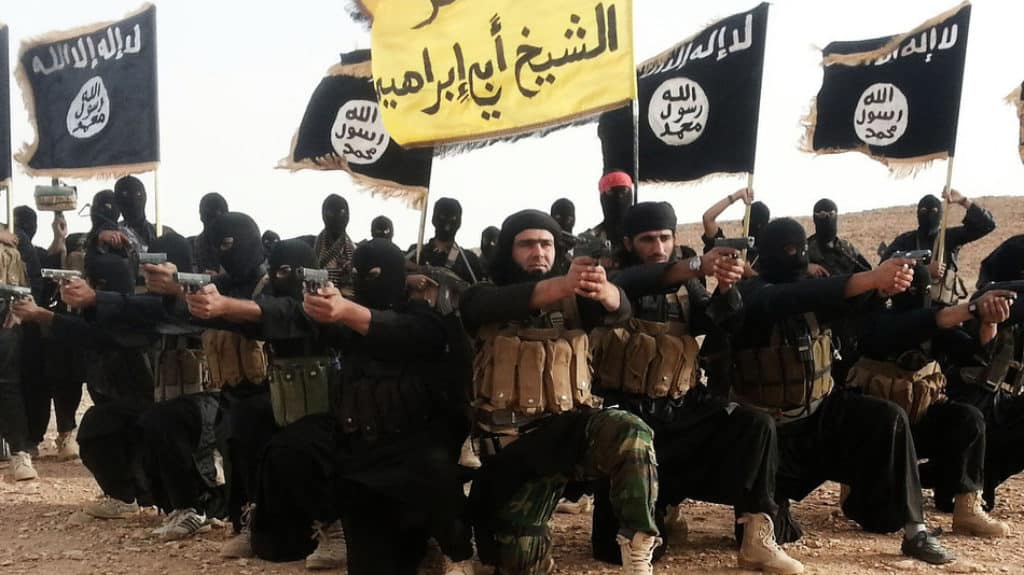
Islamic State military commander Abu Wahib (center)
The US military killed Abu Wahib, the notorious Islamic State military commander who was responsible for overrunning much of Anbar province in 2014. Abu Wahib waged jihad with al Qaeda during the US occupation and escaped from an Iraqi prison in 2012 to rejoin the fight.
Pentagon Spokesman Peter Cook announced today that the US killed Abu Wahib, “the Islamic State of Iraq and the Levant’s military emir for Iraq’s Anbar province,” in an airstrike on May 6. Three additional “ISIL jihadists” were killed in the airstrike, which is said to have taken place in Rutbah, a remote desert town located near the Jordanian border.
“Abu Wahib’s death is another blow to ISIL’s leadership that will further degrade its ability to operate, especially in Anbar province,” Cook said.
The Islamic State has suffered significant losses in Anbar province over the past year, losing the cities of Ramadi and Hit. The Islamic State still controls Fallujah in the east, Rutbah, and a number of towns in the west along the Euphrates River up to the Syrian border.
Abu Wahib, whose full name is Shakir Wahib al Fahdawi al Dulaimi, has been waging jihad in Iraq for more than a decade. He was detained by US forces in Ramadi in 2006 during the height of al Qaeda in Iraq’s insurgency. Cook described Abu Wahib as “a former member of al Qaeda in Iraq,” which morphed into the Islamic State of Iraq and remained part for al Qaeda’s network. The Islamic State became independent of al Qaeda in the spring of 2014 after Ayman al Zawahiri ejected the group due to a leadership dispute with Abu Bakr al Baghdadi.
Wahib was sentenced to death and transferred to Tikrit Central Prison. In November 2012, he escaped along with 110 inmates after the Islamic State of Iraq assaulted the prison. That jailbreak and others like it infused the Islamic State of Iraq with leaders and fighters who were captured during US and Iraqi military operations.
By 2013, Abu Wahib emerged as the Islamic State in Iraq’s military commander for Anbar province. He was responsible for executing a series of military operations that ultimately led to the fall of Fallujah in January 2014. A host of towns along the Euphrates River Valley fell to his forces during the Islamic State’s onslaught in the summer of 2014.
Abu Wahib’s crowning achievement was the taking of Ramadi, Anbar’s provincial capital, in May 2015. He organized his forces to overrun the city and forced Iraqi military units to abandon their posts despite an active US military air campaign in the province. The Islamic State held the capital for seven months until Iraqi forces, backed by US airstrikes, drove them from the city at the end of December 2015.
In addition to his military campaigns, Abu Wahib appeared in Islamic State propaganda videos. He is best known for executing soldiers, policemen, and civilians after capturing. Abu Wahib, unlike most jihadists in the Islamic State’s snuff films, refused to cover his face.








3 Comments
Abu Wahid can now reap his eternal reward in Hell. All decent people should rejoice at this news.
Bill neglects to mention amongst all his other accomplishments that Abu Wahib was a dedicated family man, survived by 4 wives and innumerable offspring, who greatly enjoyed cricket in his spare time. He achieved martyrdom doing what he most loved: working for the downfall of Yankistan and its House-Arab vassals.
RIP, gone too early but never forgotten!
Like with Shishani, no proof while ISIS denies it. Somehow I think Obama is just putting this stuff out to demonstrate progress in his otherwise stalled out war where he screwed up at every step of the way. It was clear the only way to defeat ISIS was to take Assad out first and support the FSA in doing so. He failed to do so. Now his mess keeps growing.